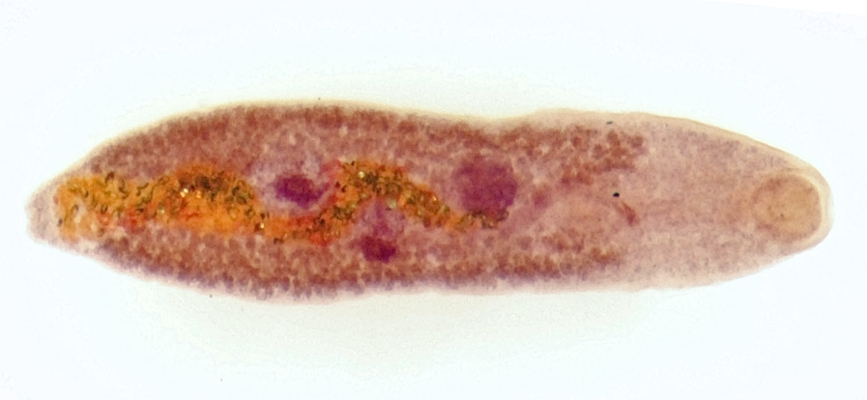Loans and Sampling Policies and Procedures
The Division of Parasites follows the same general museum policies as outlined for the entire Museum of Southwestern Biology. Additional policies specific to the Division of Parasites are listed below.
Requesting a Loan
- Write a letter (or e-mail) addressed to the Collection Manager, Sara Brant, Division of Parasites, MSB, to request specimens. The request letter must include: Approval of the loan by the Collection Manager is contingent upon the information provided in the written request and availability of those specimens in the collection. If the loan is approved, and specimens of requested taxa are available, the Collection Manager will mail the loan, along with a completed hard-copy loan form and an email copy. Approval of the loan by the Collection Manager is contingent upon the information provided in the written request and availability of those specimens in the collection. If the loan is approved, and specimens of requested taxa are available, the Collection Manager will mail the loan, along with a completed hard-copy loan form and an email copy.
- The collection number (from published descriptions or from the Arctos database), and original scientific name of the parasite
- The purpose of the loan; what research will the specimens be used for, how will the specimens be handled and used, feasibility and timeframe of the study, methods
- Name and address of the facility where the specimens will be kept,
- Provide the name of the person who will be responsible for the specimens, along with contact information. Graduate students requesting specimens must be co-signed by their faculty advisor.
- Provide a mailing address to which the loan should be mailed. Only written requests providing all of the above information will be considered for loans.
- Approval of the loan by the Collection Manager is contingent upon the information provided in the written request and availability of those specimens in the collection. If the loan is approved, and specimens of requested taxa are available, the Collection Manager will mail the loan, along with a completed hard-copy loan form and an email copy. Tissue loans, once approved by the Division of Parasites, are to be arranged through the Division of Genomic Resources.
Loan Conditions
- Borrowing institution(s) must meet minimum standards for security, storage environment, and handling of specimens (as stated in letter of request, see above). Specimens must be protected from theft, extreme light, temperature, humidity, dust, etc. The borrower is held responsible if damage or loss is due to causes reasonably under the borrower's control.
- Upon receipt of the loan, immediately inspect the specimens to: 1) make sure that the mailed specimens match the list of specimens on the loan form, and 2) make sure that the condition of the mailed specimens matches the condition noted on the loan form. Then complete information on the form and sign, mail or e-mail one copy to the MSB Collection Manager, and retain the other copy.
- All loans are for one year. Extensions of the loan may be granted upon request.
- Transfers of loans by the borrower to any other institution may not be made without the permission of the Division of Parasites.
- The condition of the specimens is evaluated by the Collection Manager at the time that the loan is prepared. All specimens must be returned in the same condition. Loaned specimens may not be cleaned, repaired, dissected or altered in any manner, nor can any alterations be made on previous identifications without prior written permission. We reserve the right to apply special loan conditions in addition to those listed above, if the circumstances warrant.
- Loans are not available as gifts or on loan for teaching, demonstrations, or student collections.
- The Division of Parasites is acknowledged in any publications resulting from loaned material.
- Proper citation: Division of Parasites, Museum of Southwestern Biology, University of New Mexico
- One copy (hard copy or pdf copy) of any publication resulting from use of data or specimens housed in the Division should be sent to the Division.
- Abuse of MSB Division of Parasites loan policies will be denied future loans.
Destructive Sampling Policy
It is our goal to try and have material available for molecular investigations, while still maintaining preservation considerations. This would include frozen specimens and those in alcohol (or other preservation media). Before approving requests, we will evaluate each request on a case-by-case basis and judge the availability of the requested specimens and the opportunity to archive replacement material.
Destructive sampling requests for any parasite materials should be directed to both the Curator and Collections Manager for review and approval. Requests should follow the procedure outlined above for specimen loans. Destructive sampling requests should include:
- Justification for destructive sampling and
- Brief description of an estimate of the amount of material needed and of the extraction protocol
Destructive Sampling Conditions
In addition to the conditions stated above for loans, tissue requests are subject to additional terms:
- Borrowers must return unused portions of the tissue samples to the Division of Parasites. This rule allows for maximal use of tissues and prevents loss. Unused tissues may not be distributed to other researchers without written consent.
- If applicable, borrowers are requested to return a portion of the extract derived from the samples (e.g., DNA, protein). Extracts may not be distributed to other researchers without written consent.
- DNA sequences, protein sequences etc., must be deposited to a database that makes information available to the public (e.g., GenBank). The accession numbers of all specimens annotated with GenBank (or another database) also should be sent to the Division of Parasites.
- Borrowers are responsible for shipping costs of tissue samples (and any other information) returned to the Division of Parasites.


